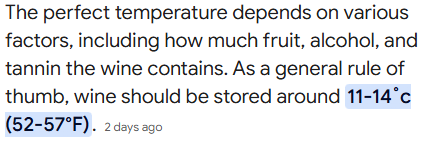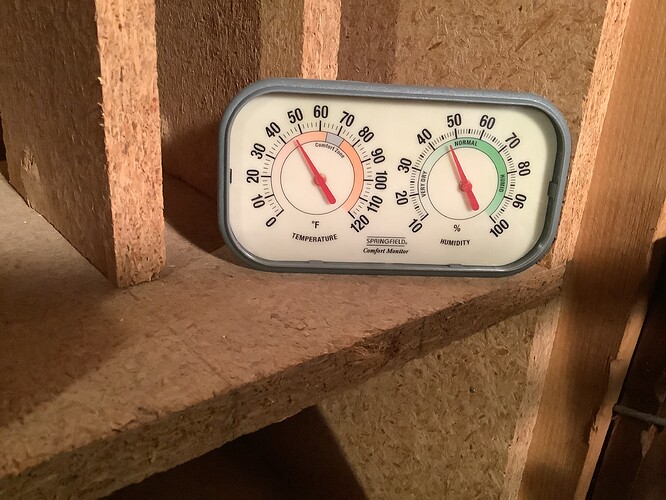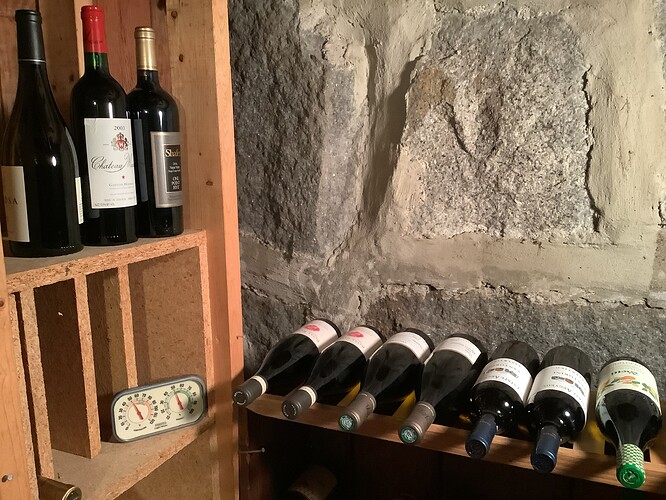Thats really interesting, thanks Greg
I read that article, too. And I think it was Margaux. But I’ve never since been able to locate it on the web. Would love to read it again. My recollection is they recited quite a bit of historical data regarding temps and, as you say, the fluctuations that naturally took place over months, years. I don’t recall that the article discussed humidity levels, though (I’m guessing - but actually know nothing about it - that humidity isn’t an issue in subterranean cellars in France or much of Europe. Certainly could be wrong, though). ![]()
I can see it reference in here:
“ The cellar temperature at Château Margaux in Pontallier, France ranges from 52°F to 65°F (11°C to 18°C) depending on the season.”
Yeah, a quick Google search yesterday yielded that for me, also. But the article I remember actually had some much more detailed history information by months or years.
That sounds like a smart solution! I can imagine that having a wine fridge with that capacity helps you store both your wine and other drinks in the proper conditions. Creating an ideal space for special bottles is definitely a worthwhile investment in my opinion.
Additionally, I indeed like to save my wines for a longer period of time. Within the seasons, temperature can change a lot in my home, that is why I am dubious about saving my wines for years without temperature control. The change in temperature at my home between July and January is huge. It can differ about 10 degrees in my storage area.
That is why I am looking for more ways to properly store my wine, and I am considering to buy a wine humidor. These maintain a constant humidity and temperature, which is perfect for long-term storage. I stumbled across this humidor. It can also store my cigars ![]() . However, it does cost a lot.
. However, it does cost a lot.
Best of luck with your wine storage!
The ideal temperature for wines is between 11-14C/50-57F:
Isn’t it weird then, that some humidors can have a temperature up to 18C/64F? As written here:
2 Eurocaves and an offsite locker
Source? Some AI thing?
As has been pointed out, that’s the often-repeated common wisdom (though I’ve never seen it said that the ideal temperature varies with the structure of the wine!). But, as others have pointed out, while that may be a safe range, no one has come up with any evidence for specifying that so narrowly, and there is evidence that a wider range won’t hurt wines.
Interesting.
One factor to consider is the thermal mass of the wine, which I imagine is significant if Margaux stacks unlabeled bottles in bins, as many properties do. I’ve found in my passive cellar that, even when the air temp is 65-66F in the summer, when I check the bottles with a temperature gun, they’re significantly cooler – around 60F. (I store them in cardboard and wood boxes, which may provide a bit of additional insulation against the air temp.)
Wow, I have not seen a combo like that before! I too have a wineador for my cigars to ensure all my vices are properly stored.
For the wines, I wanted peace of mind for certain wines - birth year wines for my nieces, anniversary wines for my wife and I. These wines will be laying down for many years, possibly decades, so to me, it makes sense to invest in storage that maximizes the chances they’ll be proper when opened.
Both of my wine fridges moderate temperature and humidity. However, here in Las Vegas, I’ve noticed I need to help them along a bit by adding some Boveda packs and occasionally some distilled water. Again, for me, the effort makes sense given the investment.
Please report back if you end up with the combo device - I’d be curious to know how you like it.
Hi John, you can find the source if you click the image.
This thread got me thinking about my basement passive wine cellar. I won’t be changing anything after about 40 years, but I was curious about the temperature and humidity extremes that might be happening. Here is a reading after three of the coldest winter days we are likely to experience in a typical winter. My guess is that on the warm side the cellar temperature might reach mid 60’s during the hottest days of summer. I am comforted by the post above mentioning wide fluctuations in some wine cellars in Bordeaux. ![]()
Interesting mine runs at between 40 and 50 humidity…I keep thinking it should be higher. Thoughts?
Hi John,
In my opinion, it should be higher than that. Also, the general rule is it should be between 60%-75%. The site I bought my wine cooler from says this as well, and my wines taste perfectly.
Maybe you should check the humidity meter?
Please let me know, I am happy to help!
I agree that especially young wine is quite hardy. That said, older bottles really do need proper storage conditions, or you’re likely to run into problems. Generally the conventional wisdom is a good starting point. I have had various overflow spaces throughout the years and have run into problems with corks failing both due to low humidity and diurnal temperature variations (annual variations are much less of a concern, at least if the summer temperatures don’t go to high - if they do that can also be problematic). Obviously wine also matures far more quickly at higher temperatures, so for long term storage this is very important. While particularly older corks are more likely to fail, persistently high temperatures (thinking 24c plus) and/or frequent short-term temperature fluctuations can cause leaks from diam-sealed bottles and even screw caps (as was the case with a high-filled bottle of German Riesling a friend of mine kept in his kitchen for a few months). As an aside, some wine-fridges that don’t have humidity control can actually be very bad for the wine. I bought a second-hand fridge many years ago and quite a few of the older bottles I kept in it ended up leaking as the humidity was very low).
I think the idea that consistency is more important than the actual number when it comes to temperature always made the most sense to me. As in, long term storage at 60 very likely just as good as 55 as long as there is no significant delta happening on a regular basis. Greg’s explanation on the cork stress would explain that.
I’m guessing for medium term storage anything under 70 is probably fine. For pricey cherries I’d probably be more apt to get that number down to 60 or under…for superstition or something.
Similarly, the more I’ve thought about the humidity numbers the less it seemed significant. The cork is over or on more than 700 ml of water after all.
Wow man, that’s a cold basement.
But this is a brett problem. Not a general wine problem. If you don’t want brett blooms don’t buy wines with brett. Otherwise, the temperature brett blooms at is a non-issue.
Ha!
Granite block foundation, unheated basement except a bit of heat given off from the heating system and exposed distribution pipes.
On the positive side, there is no need to refrigerate most of my whites in winter!
This is comforting to see. Have you had any bottle storage issues over the years?
I’m currently storing wine in my basement under similar conditions with seasonal variation. Right now the air temp hovers between 40-45F and around 60% humidity. I’ve been monitoring it for the last two years and it peaks at around 70 F in the hottest part of the summer. Majority of the year it is below 55F and consistently 60-65% humidity.


